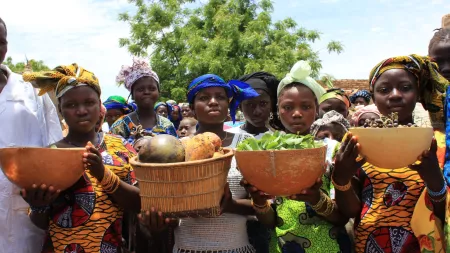- New sanctions against Mali could have a devastating impact on the country, where one in three people are already dependent on humanitarian aid.
- 13 NGOs are urging all states and bodies supporting these sanctions to unequivocally commit to applying humanitarian exemptions, so that life-saving aid can reach all those in need.
Bamako, Mali, 19 January 2022 — A group of 13 NGOs are calling for the international community to protect the people of Mali, following the announcement of new sanctions against the country in response to the interim authorities’ decision to shelve the democratic elections promised for next month.
Last week, the European Union announced plans to support the Economic Community of West African States (ECOWAS) in the implementation of collective sanctions on Mali. The restrictions by ECOWAS include closing borders and imposing a trade embargo, as well as cutting off financial aid and freezing the country’s assets at the Central Bank of West African States. The transition government of Mali has reciprocated, closing its borders with all ECOWAS member states, apart from Guinea.
These sanctions will have devastating consequences for the people and the humanitarian situation in Mali. The population of Mali already faces the worst food insecurity seen in 10 years, with over 7.5 million people - more than a third of the country’s population - in need of humanitarian aid. It’s critical that these new restrictions do not further hamper people’s ability to access humanitarian assistance and basic social services in a country where 70% of the food is imported and where 1.2 million Malians are facing a food crisis. Mali is strongly dependent on external assistance to finance basic social services. In the area of health, for example, external donors covered 33% of total health expenditure in 2019.
The United States has also underlined its support for the ECOWAS sanctions, while France - in its first weeks of its Presidency of the Council of the European Union - has suspended flights to Mali.
The 13 organisations are calling for urgent humanitarian exemptions to the sanctions and any future bilateral sanctions, in order to protect the humanitarian response in Mali. To continue their work effectively, humanitarian actors must have continued unfettered capability of importing, purchasing, transporting, distributing and paying life-saving goods and services, including food and medicine, as well as guarantees that they can transfer funds into the country without violating the sanctions.
Mali, ECOWAS and the members of the international community supporting these sanctions must monitor their impact, and unequivocally commit to applying humanitarian exemptions - taking all necessary measures to limit the impact of these measures on civilians.
Ely Keïta, the CARE International Country Director in Mali, calls on the international community:
"The dignity of the Malian people is in danger and each of us has a share of responsibility to assume. Today, the food situation is worrying. It will be dramatic in the months to come, with a risk of further deterioration of the overall humanitarian situation and an increase in violence, particularly against women and girls in the most affected regions. Humanitarian aid needs to be easily reachable for the people of Mali. Please be part of the solution, not part of the problem."
Franck Vannetelle, the International Rescue Committee’s Country Director in Mali, says:
“Despite more than a third of the country’s population being dependent on humanitarian aid, organisations working in Mali already face severe access constraints. It’s imperative that the international community keeps responding to people’s urgent needs, and that any new sanctions have concrete humanitarian exemptions. These must be monitored and implemented, or the most vulnerable people in Mali will pay the price.”
The full list of signatories includes:
- International Rescue Committee
- Action Against Hunger
- CARE International
- CECI
- Danish Refugee Council
- HELP
- Mercy Corps
- Norwegian Church Aid
- Norwegian Refugee Council
- Oxfam
- Plan International
- Terre des Hommes Lausanne
- World Vision
